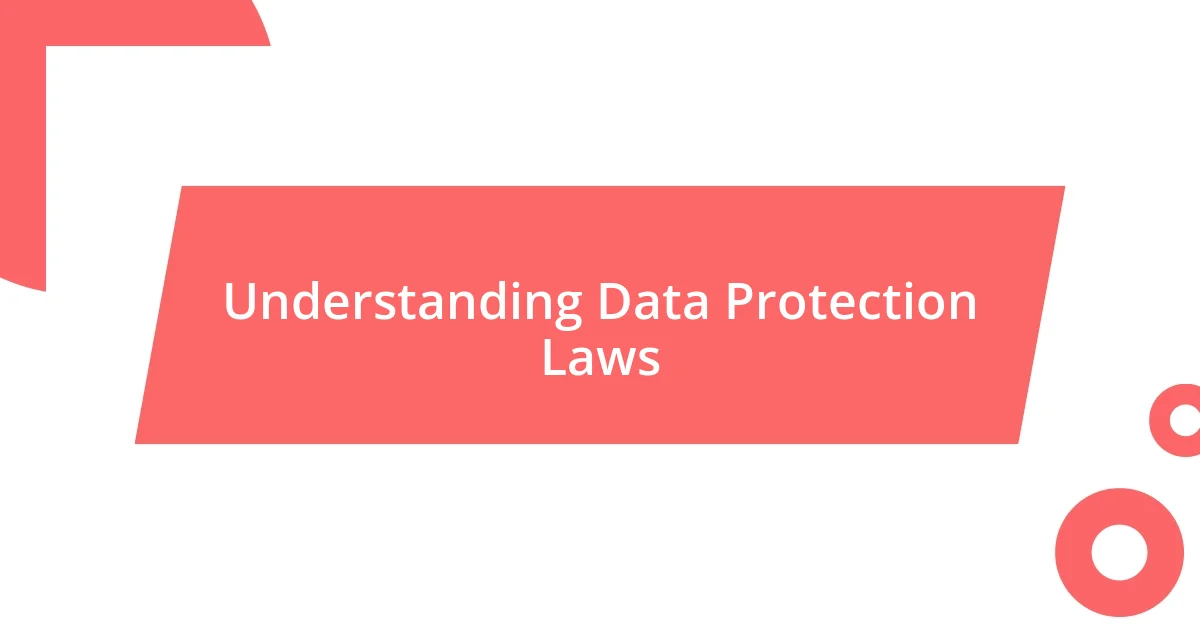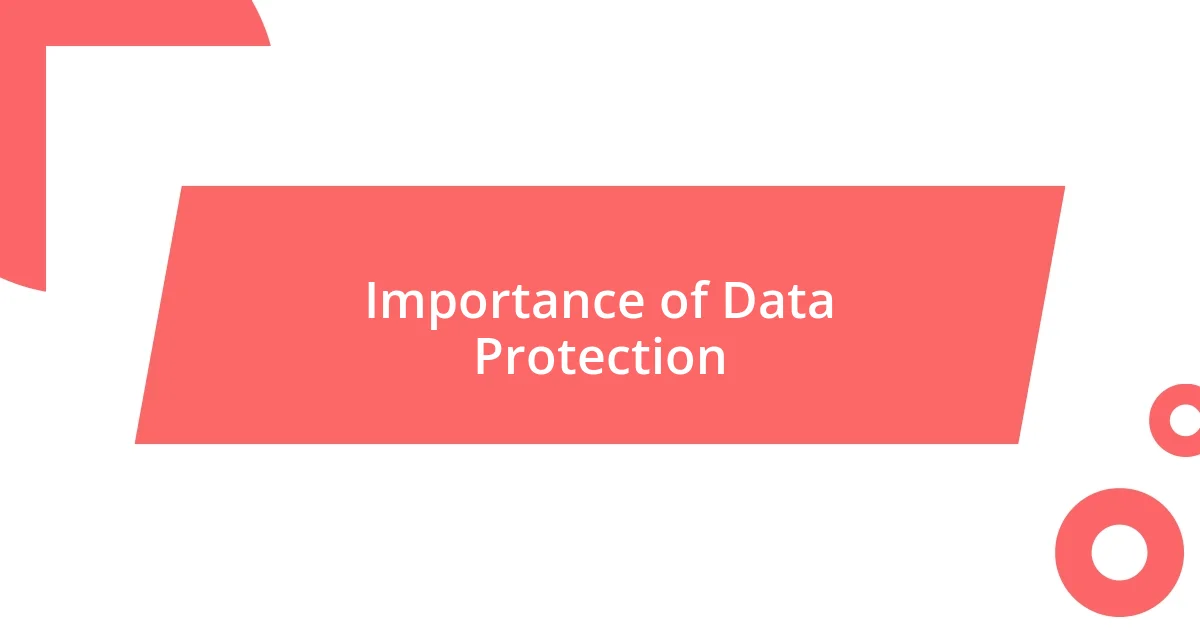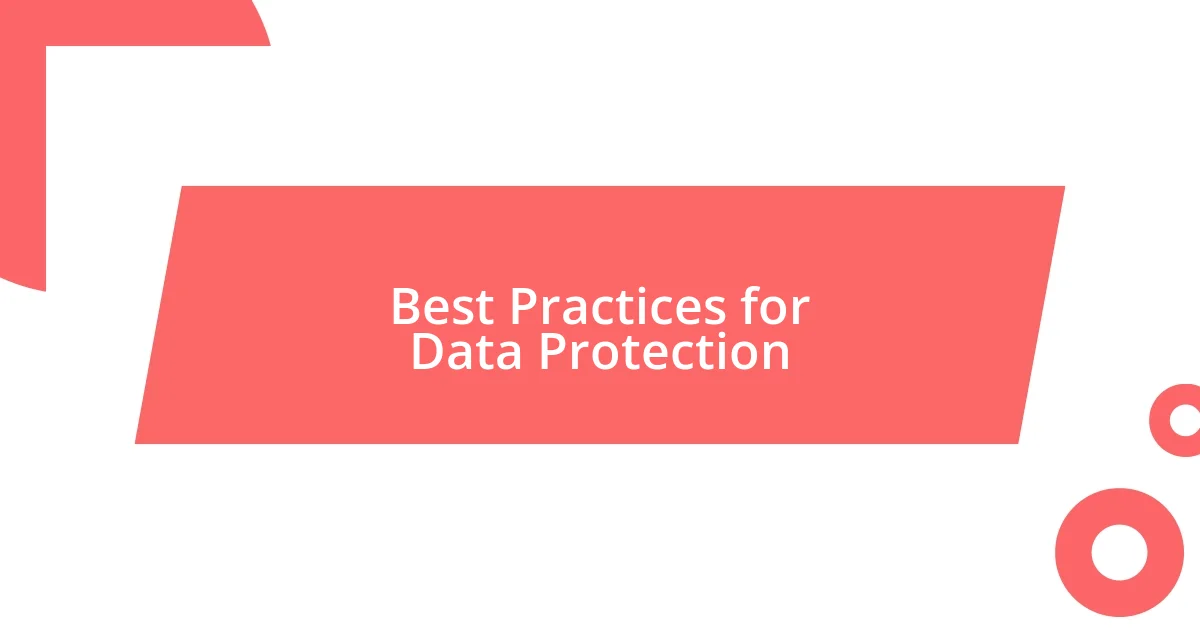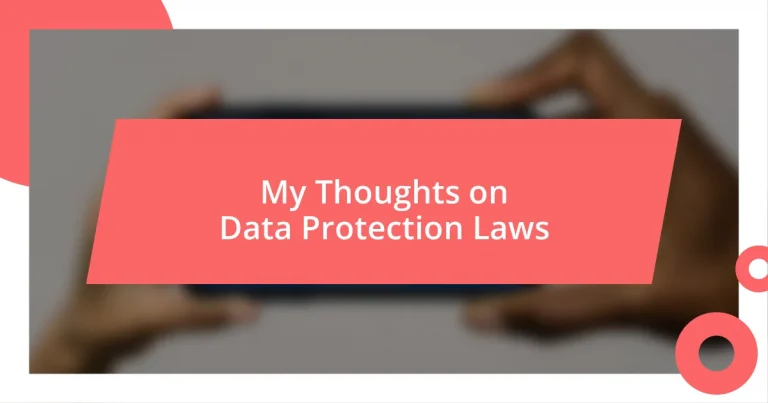Key takeaways:
- Data protection laws like GDPR and CCPA empower individuals by increasing their control over personal data and fostering awareness of digital rights.
- Compliance with data protection laws enhances business accountability, builds consumer trust, and encourages innovation in data security practices.
- Challenges in compliance include staying updated with regulations, resource limitations for smaller companies, and managing consumer privacy expectations effectively.

Understanding Data Protection Laws
Understanding data protection laws can feel overwhelming at first, but at their core, they exist to safeguard our personal information. I remember when I first learned about the General Data Protection Regulation (GDPR); it struck me how it empowers individuals. The thought that I could control my data brought me a sense of relief and responsibility.
When I think about how easily our data can slip through the cracks, I often ask myself: How many of us truly understand our rights regarding our information? These laws, like GDPR in Europe and CCPA in California, are designed to ensure transparency and give us tools to manage our data effectively. With each update and change, I find myself more aware of the digital footprint I leave behind.
It’s fascinating to see how different countries approach data protection. For instance, while Europe prioritizes strict regulations, other regions may have more relaxed controls. Personally, engaging with these laws has made me more vigilant online. I often reflect on how our collective awareness can shape the future of privacy—if we understand our rights, we can demand better protections.

Importance of Data Protection
Data protection holds immense importance in today’s digital age. I recall a time when I received a data breach notification from a service I used. It was alarming to realize that my information was compromised, highlighting how vulnerable we all are. This experience really drove home the notion that robust data protection laws are not merely formalities—they are crucial life safeguards.
Moreover, data protection laws facilitate trust in our interactions with businesses. I remember switching to a new online service that prominently displayed its commitment to data security. Seeing that made me feel safe enough to share my information, something I hadn’t felt with other platforms. The presence of strong laws legitimizes these commitments, reassuring users that their privacy is respected and valued.
Finally, I believe that effective data protection fosters innovation. I often wonder how many emerging technologies prioritize privacy. When companies are held accountable for their data practices, they seek out innovative ways to protect user information. From encryption methods to privacy-focused app designs, the right laws can spur a culture of creativity that benefits everyone. It’s inspiring to see how foundational principles of data protection can lead to advancements that make our digital experiences safer.
| Aspect | Importance |
|---|---|
| Personal Security | Protects individuals from data breaches and identity theft, allowing for safer online experiences. |
| Trust | Establishes trust between consumers and businesses, leading to higher engagement and customer loyalty. |
| Innovation | Encourages the development of new technologies and methods focused on enhancing user privacy and data protection. |

Impact on Businesses and Consumers
The impact of data protection laws on businesses and consumers is quite profound, shaping how they interact with each other. From my perspective, companies are now more aware than ever of their responsibility when handling customer data. I have witnessed firsthand how a friend’s small business implemented robust data protection practices after realizing that non-compliance could lead to hefty fines. The fear of such consequences pushed them to create a privacy policy that not only aligned with the law but also built trust with their customers.
On the flip side, consumers have become more empowered, equipped with knowledge about their rights concerning personal data. They actively seek out businesses that prioritize their privacy. Interestingly, I remember reading reviews about a new app that emphasized its adherence to data protection laws. People expressed a sense of security that influenced their decision to download it—a clear change in consumer behavior.
- Enhanced accountability for businesses leads to better data management practices.
- Consumers now demand transparency, driving businesses to improve their privacy policies.
- Non-compliance can result in significant financial penalties, influencing corporate strategy.
- Trust is built through adherence to these laws, fostering long-term customer relationships.
- An increase in user awareness regarding personal data rights shifts the balance of power towards consumers.

Challenges in Compliance
Compliance with data protection laws can be a complex and often overwhelming task for many businesses. I recall a situation where a company I worked with struggled to keep up with the constantly changing regulations. It’s not just about following the rules; it’s about making sure all employees understand them. Doesn’t it feel daunting to think about how a single misstep could lead to legal troubles?
I often see smaller companies grappling with limited resources, leading to a patchwork approach to compliance. I remember chatting with a startup founder who admitted they relied on outdated practices. It made me reflect on how essential continuous training and adaptation are in this ever-evolving landscape. It’s clear that just having a compliant policy doesn’t cut it; the execution is what truly matters.
Moreover, the challenge of managing consumer expectations adds another layer of complexity. When I think about the various privacy settings I encounter on apps, I’m often left wondering if they truly safeguard my information. This tension between wanting to offer customized services and ensuring privacy can leave businesses walking a tightrope. Isn’t it fascinating how the very tools designed to enhance our experiences can also complicate compliance?

Best Practices for Data Protection
Adopting strong data protection practices is crucial for any business looking to navigate today’s digital landscape. I recall a workshop I attended where the facilitator emphasized the importance of regular data audits. Thinking back, I could relate to the anxiety of unearthing potential vulnerabilities. It was like going through an old closet, unsure of what skeletons were hiding at the back—and I realized that taking stock can be both daunting and enlightening. Regular reviews not only help identify risks but also demonstrate commitment to compliance.
Another vital practice is employee training. I vividly remember the moment I participated in a data privacy training session at my workplace. It was eye-opening for me to understand the nuances of handling personal information. Sometimes, I think about how many employees might be left in the dark about the implications of mishandling data. By developing a culture of awareness, businesses equip their teams with the knowledge they need to protect sensitive information effectively.
Lastly, integrating data encryption into daily operations can’t be overlooked. I’ve seen how businesses with robust encryption protocols breathe a little easier knowing their sensitive information is safeguarded. But it raises the question: how many smaller firms are aware of the tools available to them? From my experience, investing in these technologies not only protects data but also fosters trust with customers. It’s about creating a secure environment where they feel valued and protected.












